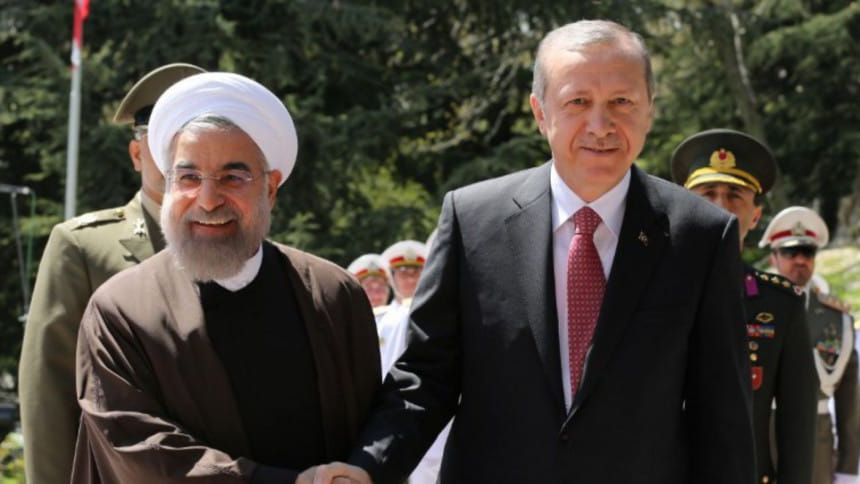The changing dynamics of power in the Middle East

POLITICAL develop-ments in the Middle East are changing and dynamics of realpolitik is at play on the heels of Tehran's recent framework nuclear agreement with six world powers. For example, Turkish Sunni President Recep Tayyip Erdogan's meeting with Iranian Shi'ah President Hassan Rouhani, on April 7, marked Turkey's push to reap a trade windfall if a final deal is reached that would lift sanctions on Iran, forgetting their differences on sectarian warfare in Iraq, Syria and now in Yemen.
It was an indication of how the countries in the Middle East confront the prospect of an end to Iran's isolation and start to recalibrate regional balances. Despite the economic sanctions and Western powers' concerns, Ankara thinks it is critical to keep the economic alliance with Tehran and have access to some of Iran's largest oil and gas reserves as Turkey significantly relies on Iran's oil and gas for its economy.
Iran and Turkey, the neighbouring countries, want to strengthen trade to $30bn in 2015. Erdogan pointed out that the balance of trade was unfavourable to Turkey, since Iran exports $10bn and imports only $4bn in Turkish products. Turkey's government is pushing to triple bilateral trade with its eighth largest trading partner to $35 billion by 2016, and to secure energy deals and boost exports.
Closer ties are on display to facilitate greater trade and other economic ties between the two countries. During the visit, eight documents - particularly in the areas of transport, customs, industry and health - were reportedly signed.
Turkey's president sought common ground on Middle East sectarian conflicts during a visit to Iran. Turkey and Iran agree on the need for a political solution to end Yemen's war, which has raised tensions between them, Iran's president has said after talks with his visiting Turkish counterpart.
"We talked about Iraq, Syria, Palestine . . . We had a long discussion about Yemen. We both think war and bloodshed must stop in this area immediately and a complete ceasefire must be established and the strikes must stop in Yemen," Iran's President Hassan Rouhani said during a joint news conference broadcast by state television.
Erdogan tried to sidestep sectarian tensions between the countries, pressing for an end to conflicts in Iraq and Syria: "I am not concerned about Shiite nor Sunnis. . . Many people are dying. It's impossible to accept this. Therefore we must come together, sit, talk, negotiate the matter and put an end to this bloodshed, these deaths."
The Iranian-Turkish thaw in relations and the rise in bilateral cooperation under Rouhani's and Erdogan's governments was initiated by the then Turkish Foreign Minister Ahmet Davutoglu's (now Prime Minister) visit to Tehran in order to attend the presidential oath of Hassan Rouhani.
It is noted that President Hassan Rouhani visited Turkey in June 2014 and the landmark trip was the first official high-level meeting between Tehran and Ankara in nearly 18 years.
In the past, it had been noted that Turkey boosted gold exports to Iran to pay for oil and gas imports—a move that helped Tehran skirt sanctions and pad central bank reserves after it was blocked from the international banking system. Iran is energy-starved Turkey's second biggest provider of oil and gas.
For Iran, when it comes to the geopolitics and balance of power in the region, Iranian leaders do not view other Arab countries in the gulf as natural allies, but instead as competitors and rivals. This is a primary reason that makes Iranian leaders view Turkey as a major and key strategic, geopolitical, and economic ally in the region.
Furthermore, Iranian leaders have been capable of avoiding U.S. and international economic sanctions while trading with Turkey. In other words, the Turkish market is a crucial platform for Iran's economy and Iranian firms that export nearly thousands of products to Turkey.
Turkish-Iranian relations have become more complicated since the Arab Spring uprisings began four years ago. Before that, Ankara voted against a United Nations Security Council resolution for additional sanctions on Iran despite strong NATO criticism.
Having said that, analysts say that due to the geopolitical, strategic, and economic landscapes, both Turkey and Iran need each other's cooperation more than anytime before. Although there are some major tensions and disagreements over the Syrian crisis and Egypt, Turkey and Iran have more shared objectives that draw them to each other, rather than push them apart.
The writer is former Bangladesh Ambassador to the UN, Geneva.

 For all latest news, follow The Daily Star's Google News channel.
For all latest news, follow The Daily Star's Google News channel. 



Comments